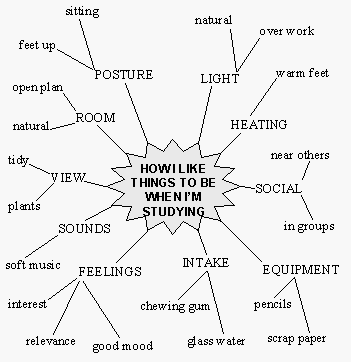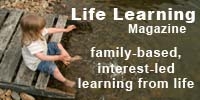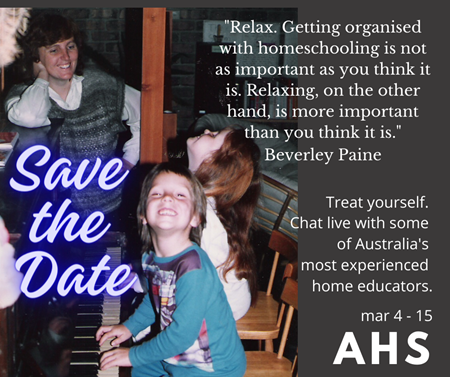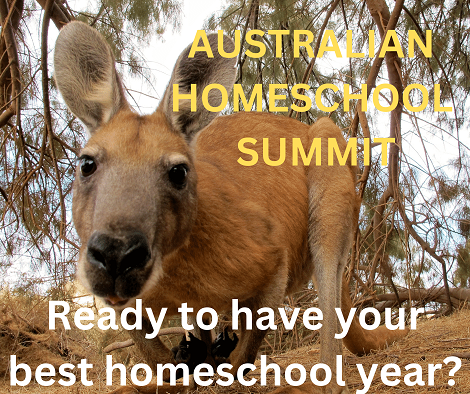|
Some Thoughts on Learning Styles
by Beverley Paine
When initially researching this topic years ago I found a great deal of controversy. There seemed to be little agreement about learning styles. Some researchers saw them as distinguishable modalities of learning found in all individuals, but others saw them as representative of learning differences between learners. Two major factors seemed to dominate much of the research; whether to teach to students' strengths and expand their learning styles, and if valid and reliable tests can be devised to determine individual learning styles. I found emphasis was always placed on improving academic performance and grades. The purpose of education was defined as a continuous process of solving problems creatively and planning for the future, however, in my own experience as a home educator, I've found that the learning has immediate and intrinsic worth and is valued for what it offers the learner in terms of personal and social growth and development. As a homeschooler I found myself asking: how does the information on learning styles by educationalists apply to home learning environments, and is any of it relevant?
Home learning environments naturally tailor instructional and educational activities in a holistic way to cater for individual needs. Learning occurs in a social context, rich in conversation and discussion and shared activity, with plenty of quiet time and solitude allowed for consolidation and reflection. One-to-one attention and the provision of personalised individual learning programs occur naturally in the home environment. Unlike schools, homeschools automatically provide guidance and instruction which include a balance of different learning modes.
When my eldest, April, was in kindergarten before we began homeschooling, the curriculum and methods of teaching were rich in a variety of learning styles deliberately focussed on holistic development. Later, when she tried school at the age of seven, I found the development focus narrowed: the students became more sedentary and were forced to adopt a predominantly visual mode of learning. Her education was dominated by text books, worksheets or books, blackboards and lectures; with a limited amount of attention given to developing speaking and listening skills. Other modes of learning were largely ignored and occurred on an ad-hoc or chance basis. This imbalance was reinforced by the assessment, recording and evaluation practices in the classroom, which relied heavily on written communication, further promoting visual learning over all other forms. This is very different to what I've discovered in most home learning environments, where families use a variety of recording techniques and assessment is a continuous process based on intimate knowledge of individual learners. Despite attempts to introduce holistic assessment systems and educational balance, based on knowledge about different learning styles into schools, reliance on visual learning continues to dominate in the classroom. This continues to place a large number of students at academic risk.
Many parents new to homeschooling duplicate school methods of instruction and soon find they face the same problems that teachers encounter with reluctant or disengaged learners. Sometimes parents believe 'one-to-one' instruction will do the trick to bring a child 'up to grade'. The continuance of a focus on visual learning methods can lead to frustration for both parents and children. In most cases the children soon teach their parents that the most effective way to educate them is to adopt a holistic view of education where conversation and hands-on activities throughout the day dominate, not only when they are reading, writing, memorising, reciting, calculating or problem solving! In other cases the parents come across a book on learning styles or learning differences that reveal a whole new way of considering education and a welcome breakthrough occurs. The parents relax; adopt methods that better suit their individual children who begin to learn with the same enthusiasm and rapidity of their early childhood years.
I personally find the value in the ongoing discussion and research about learning styles rooted in the reassurance they feel when they discover that something isn't wrong with their children, it's just that the methods they or the school used to educate their children wasn't the most efficient or effective. Instead of continuously trying to fit a particular child into 'one size fits all' educational approach, permission is granted to 'cut the suit to fit the child': to truly individualise learning opportunities. This process begins by observing the child intimately, by noticing how and when the child engages fully in learning activities of his or her own creation and volition. It means redefining education, taking the 'school' out of education, and placing 'family', home' and 'community' more fully in central place. It means valuing all the learning senses; sight, hearing, touch, smell, taste; using the whole body not just the eyes or ears, and valuing emotional input and quiet reflection. It's something that's very hard to achieve in a classroom setting.
As beginners on this alternative learning continuum we often project their own learning styles and preferences onto our children and either 'teach' the way we were or weren't taught, using our past experiences to guide us. Patience and permission is needed to facilitate change to more effective methods of instruction for our children, which allow their uniqueness to shine. Until then we'll meet resistance to learning: 'tiredness', declarations of boredom, fidgeting and irritability, reluctance or inability to 'settle' or concentrate, and daydreaming. These warn of a mismatch of child to learning activity, modality or perhaps objective. Like us, children need learning tasks to be personally meaningful, and built on previously understood and internalised concepts. The foundations need to be there, solid and firm, for the next step to proceed.
Context and environment have a profound effect on learning ability. A comfortable child who is not experiencing undue stress will learn more efficiently. It's unfortunate that the myth that children learn best when quiet, sitting upright at desks, attending to books is dying a slow, lingering death. Ward and Daley, in their book Learning to Learn offer a check list for determining environment and emotional factors that contribute to a productive learning state:
• Room: furniture arrangement desk, shelving, filing system, seating, wall space, posters, plants, windows, etc
• Posture: sitting on hard/soft cushions, bed/chair/floor; sitting with feet up, back supported; lying on floor/bed...
• View: out a window; blank wall; study plan; stimulating colours; plants; movement/still; tidy/messy/clam/busy...
• Sounds: silence/quiet sounds/busy working noises/ music (type and speed); own voice; water; other people ...
• Light: gentle light; sunlight; bright light; candles; central lighting/desk lamp; coloured lighting; natural light...
• Heating: hot, stuffy; cool; pleasantly warm; body warm, head cool, feet warm, fresh air, wrapped in blanket...
• Social: being with others; alone; having others to speak to occasionally; working with another person/group, being able to use the phone; around people you know/don't know...
• Intake: sipping water regularly; water before/after session; nibbles available all the time; eating before; chewing gum; rewarding with food/drink/something special...
• Equipment: the types and colours of pens and highlighters, white/coloured paper/books, large/small paper, stapler, tape, storage racks, file box/folders/cabinet, music tapes, tape player/radio, etc...
• Feelings: goals, planning, motivation, interest, desire to succeed, independence, response to past success and failure, encouragement from others, liking and disliking, relevance to present and future, pleasing self and others, expectations, moods, stickability, concentration span...
It's easy to determine an optimum personal learning state for any individual by asking questions related to the above checklist. This is a copy of the mind map I drew when determining mine personal learning state:
"HOW I LIKE THINGS TO BE WHEN I'M STUDYING"

The quality of the learning environment can dramatically affect learning outcomes. Things like tobacco smoke, radiation and other emissions from computer screens, microwaves and televisions, loud noises or music, the often unnoticed flashing from some fluorescent lights, lack of fresh air, strong smells, 'loud' or bold patterns, excessive background noise, and inadequate sunlight intake coupled with bad diet, poor nutrition, allergies and food intolerances, inadequate water intake, physical tiredness and stress, emotional stress, illness, lack of exercise and low level continuos pain can all have a negative impact on learning.
The antidotes, often overlooked when discussing children and reluctance to learn or learning difficulties, are based on common sense and healthy living practices. The tendency to blame the learner for 'not learning' in less than ideal learning environments is still very strong. It can be relatively easy to redress adverse learning conditions by eliminating and retraining old habits and giving some attention to improving the physical environment. Increased learning ability can result from simply turning off the television, listening to slower, music with a regular beat softly, opening the windows and letting in natural light and fresh air, engage in regular exercise outside or eating a nutritionally balanced diet. Always have wholesome snacks and water available to busy learners.
Another critical aspect to the learning process is attitude: it is impossible to learn if the learning task is thought of as impossible to achieve. Positive self-talk, a high regard for learning and the learner, realistic expectations and goals, confidence, resilience, acceptance of risk and challenge, respect and trust are all conducive to greater learning efficiency. Developing a positive attitude to learning is an important educational goal.
In the home learning environment children are given more space, time, stimulation, love, consideration, access to materials, information, conversation and discussion than children in schools. Learning unfolds in a natural way, as it did in early childhood. There are always things that you can do to enhance the learning environment and should be doing, because they make sense. There will be things that work with one child and not another. By observing our children closely, listening to them, and talking to them about their learning processes we can constantly improve the learning activities we provide for them.
See also Learning Styles and Preferences.

Was this article helpful? Was it worth $1.00 to you?
Your gift of $1 or more helps to keep this site operating
offering encouragement
and reassurance to families
wanting
better outcomes for their children.



Beverley Paine with her children, and their home educated children, relaxing at home.
Together with the support of my family, my aim is to help parents educate their children in stress-free, nurturing environments. In addition to building and maintaing this website, I continue to create and manage local and national home educating networks, help to organise conferences and camps, as well as write for, edit and produce newsletters, resource directories and magazines. I am an active supporter of national, state, regional and local home education groups.
"You've been an inspiration to me, I love the way
you really listen to people." Vanessa
"Whenever I read your writing I always come away
with increased confidence in my ability to provide and
share a wonderful learning journey with my family!" Davina
"Your guidance, understanding, support and words of
wisdom changed our lives. We now offer support and
organise many homeschooling events for others." Lesley
"Thank you once again for your prompt and friendly service.
I am convinced that your books are going to add
quality and peace of mind to my journey of teaching my kids
at home! Just from studying your website, until almost
2am
in the morning, I 've been encouraged!" Louisa
"Thank you for all your many,many reassuring words
over many, many years. You probably don't know exactly how
valuable you are to the Australian Home Education community.
I've been reading your stuff for maybe 8 years or more now.
And I'm very grateful." Gythaa


CLICK HERE
if you want to learn
how to write your own education plans
to suit
your unique children's
individual learning needs?
Or you are looking for quality curriculum and teaching tips...
|
|
Welcome to the World of Home Education
and Learning without School!
We began educating our children in 1985, when our eldest was five. In truth, we had helped them learn what they need to learn since they were born. I am a passionate advocate of allowing children to learn unhindered by unnecessary stress and competition, meeting developmental needs in ways that suit their individual learning styles and preferences. Ours was a homeschooling, unschooling and natural learning family! There are hundreds of articles on this site to help you build confidence as a home educating family. We hope that your home educating adventure is as satisfying as ours was! Beverley Paine
3 ESSENTIAL STEP BY STEP GUIDES
Let experienced home educators Beverley, Tamara and April walk you through HOW to create a learning plan that builds on solid foundations that works for YOUR family AND ticks all the boxes for home educaton registration!
|

Tap into Beverley's
experience
through her books
"Your books, your blogs helped me beyond words... they helped me to find comfort in knowing it is ok to choose exactly what is best for my family." Nisha
"Your books and information are mind blowing and already I am feeling good about this new experience." Diane
"Your guidance, understanding, support & words of wisdom changed our lives." Leslie
"I feel specially inspired by Beverley's words and, the more I read her comments, the more inspired I feel, since my need for support, respect for different parenting styles, and information are fully met." Marijo
|
 |
|

The information on this website is of a general nature only and is not intended as personal or professional advice. This site merges and incorporates 'Homeschool Australia' and 'Unschool Australia'.
The Educating Parent acknowledges the Traditional Aboriginal and Torres Strait Islander Owners, the Custodians of Australia, and pay our respects to Elders past and present and extend that respect to Aboriginal and Torres Strait Islander people viewing this website.

Advertise on this site.













Australia's premier online annual conferences, lifetime access to video and audio recordings, freebies, notes and associated resource guides.
EVERY SUMMIT IS UNIQUE!
$29 each  2023 2023   2022 2022   2021 2021
$25 each  2020 2020  2019 2019   2017 2017
"Biggest and best Aussie homeschool event of the year!"

Home education is a legal alternative
to school education in Australia.
State and Territory governments are responsible
for regulating home education and have different
requirements, however home educating families
are able to develop curriculum and learning programs
to suit the individual needs of their children.

Without revenue from advertising
by educational suppliers and Google Ads
we could not continue to provide information
to home educators. Please support us by letting
our advertisers know that you found them on
The Educating Parent. Thanks!
|
![]() About
About
![]() Blog
Blog
![]() Articles
Articles
![]() Curriculum
Curriculum
![]() Resource Directory
Resource Directory
![]() Shop
Shop
![]() Kids Pages
Kids Pages
![]() Facebook
Facebook

![]() SA
SA ![]() VIC
VIC ![]() NSW
NSW ![]() QLD
QLD ![]() TAS
TAS ![]() ACT
ACT ![]() NT
NT ![]() NSW
NSW ![]() QLD
QLD ![]() SA
SA ![]() WA
WA ![]() TAS
TAS ![]() ACT
ACT ![]() NT
NT 






















